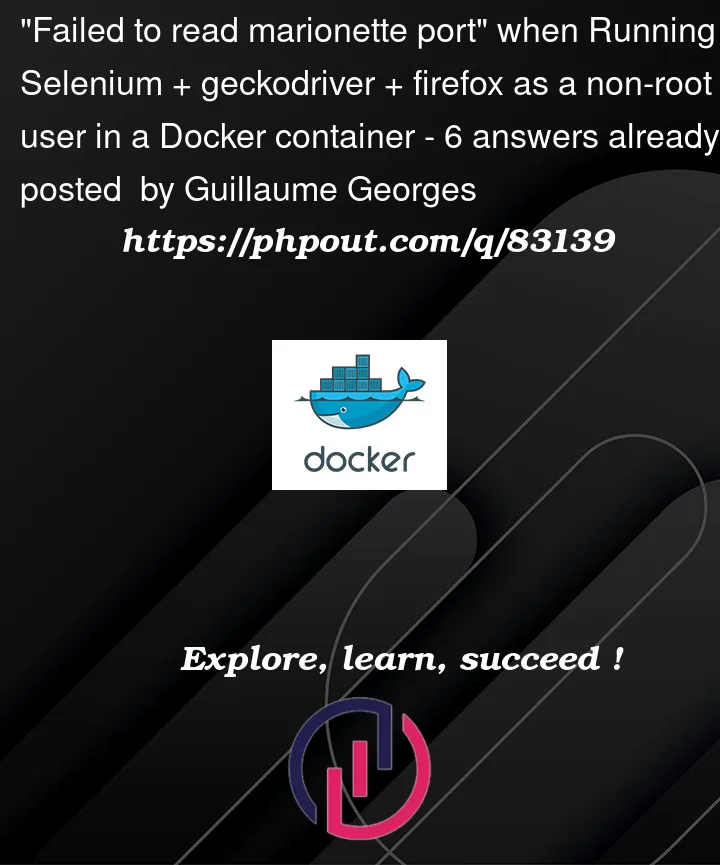I’m running selenium tests inside a docker container, with Firefox and Geckodriver.
When running that container as root, everything works fine.
When running the container as non-root user (USER 1000), the driver fails to initialize :
[[1;31mERROR[m] test01_WO_default_dashboard Time elapsed: 132.6 s <<< ERROR!
org.openqa.selenium.TimeoutException:
Failed to read marionette port
Build info: version: '3.14.0', revision: 'aacccce0', time: '2018-08-02T20:19:58.91Z'
System info: host: 'testrunner-cockpit-3--1-mdbwj', ip: '10.130.2.18', os.name: 'Linux', os.arch: 'amd64', os.version: '4.18.0-305.28.1.el8_4.x86_64', java.version: '11.0.15'
Driver info: driver.version: FirefoxDriver
remote stacktrace:
at java.base/jdk.internal.reflect.NativeConstructorAccessorImpl.newInstance0(Native Method)
at java.base/jdk.internal.reflect.NativeConstructorAccessorImpl.newInstance(NativeConstructorAccessorImpl.java:62)
at java.base/jdk.internal.reflect.DelegatingConstructorAccessorImpl.newInstance(DelegatingConstructorAccessorImpl.java:45)
at java.base/java.lang.reflect.Constructor.newInstance(Constructor.java:490)
at org.openqa.selenium.remote.W3CHandshakeResponse.lambda$new$0(W3CHandshakeResponse.java:57)
at org.openqa.selenium.remote.W3CHandshakeResponse.lambda$getResponseFunction$2(W3CHandshakeResponse.java:104)
at org.openqa.selenium.remote.ProtocolHandshake.lambda$createSession$0(ProtocolHandshake.java:122)
at java.base/java.util.stream.ReferencePipeline$3$1.accept(ReferencePipeline.java:195)
at java.base/java.util.Spliterators$ArraySpliterator.tryAdvance(Spliterators.java:958)
at java.base/java.util.stream.ReferencePipeline.forEachWithCancel(ReferencePipeline.java:127)
at java.base/java.util.stream.AbstractPipeline.copyIntoWithCancel(AbstractPipeline.java:502)
at java.base/java.util.stream.AbstractPipeline.copyInto(AbstractPipeline.java:488)
at java.base/java.util.stream.AbstractPipeline.wrapAndCopyInto(AbstractPipeline.java:474)
at java.base/java.util.stream.FindOps$FindOp.evaluateSequential(FindOps.java:150)
at java.base/java.util.stream.AbstractPipeline.evaluate(AbstractPipeline.java:234)
at java.base/java.util.stream.ReferencePipeline.findFirst(ReferencePipeline.java:543)
at org.openqa.selenium.remote.ProtocolHandshake.createSession(ProtocolHandshake.java:125)
at org.openqa.selenium.remote.ProtocolHandshake.createSession(ProtocolHandshake.java:73)
at org.openqa.selenium.remote.HttpCommandExecutor.execute(HttpCommandExecutor.java:136)
at org.openqa.selenium.remote.service.DriverCommandExecutor.execute(DriverCommandExecutor.java:83)
at org.openqa.selenium.remote.RemoteWebDriver.execute(RemoteWebDriver.java:548)
at org.openqa.selenium.remote.RemoteWebDriver.startSession(RemoteWebDriver.java:212)
at org.openqa.selenium.remote.RemoteWebDriver.<init>(RemoteWebDriver.java:130)
at org.openqa.selenium.firefox.FirefoxDriver.<init>(FirefoxDriver.java:125)
Relevant parts of my Dockerfile :
FROM ubuntu:20.04
# install firefox
ARG FIREFOX_VERSION=latest
RUN FIREFOX_DOWNLOAD_URL=$(if [ $FIREFOX_VERSION = "latest" ] || [ $FIREFOX_VERSION = "nightly-latest" ] || [ $FIREFOX_VERSION = "devedition-latest" ] || [ $FIREFOX_VERSION = "esr-latest" ]; then echo "https://download.mozilla.org/?product=firefox-$FIREFOX_VERSION-ssl&os=linux64&lang=en-US"; else echo "https://download-installer.cdn.mozilla.net/pub/firefox/releases/$FIREFOX_VERSION/linux-x86_64/en-US/firefox-$FIREFOX_VERSION.tar.bz2"; fi)
&& apt-get update -qqy
&& apt-get -qqy --no-install-recommends install firefox libavcodec-extra
&& rm -rf /var/lib/apt/lists/* /var/cache/apt/*
&& wget --no-verbose -O /tmp/firefox.tar.bz2 $FIREFOX_DOWNLOAD_URL
&& apt-get -y purge firefox
&& rm -rf /opt/firefox
&& tar -C /opt -xjf /tmp/firefox.tar.bz2
&& rm /tmp/firefox.tar.bz2
&& mv /opt/firefox /opt/firefox-$FIREFOX_VERSION
&& ln -fs /opt/firefox-$FIREFOX_VERSION/firefox /usr/bin/firefox
# install geckodriver
ARG GECKODRIVER_VERSION=latest
RUN GK_VERSION=$(if [ ${GECKODRIVER_VERSION:-latest} = "latest" ]; then echo "0.31.0"; else echo $GECKODRIVER_VERSION; fi)
&& echo "Using GeckoDriver version: "$GK_VERSION
&& wget --no-verbose -O /tmp/geckodriver.tar.gz https://github.com/mozilla/geckodriver/releases/download/v$GK_VERSION/geckodriver-v$GK_VERSION-linux64.tar.gz
&& rm -rf /opt/geckodriver
&& tar -C /opt -zxf /tmp/geckodriver.tar.gz
&& rm /tmp/geckodriver.tar.gz
&& mv /opt/geckodriver /opt/geckodriver-$GK_VERSION
&& chmod 755 /opt/geckodriver-$GK_VERSION
&& ln -fs /opt/geckodriver-$GK_VERSION /usr/bin/geckodriver
&& geckodriver --version
I even added some chmod / chown to try and fix some permissions issues with firefox or geckodriver :
RUN chown 1000 -R /usr/bin/geckodriver
&& chmod 775 -R /usr/bin/geckodriver
&& chown 1000 -R /usr/bin/firefox
&& chmod 775 -R /usr/bin/firefox
And finally the USER instruction to run the container as non-root
USER 1000
I do not manually install selenium. It’s a maven dependency of the project I’m installing where my tests sources are.




6
Answers
According to this MR https://github.com/SeleniumHQ/docker-selenium/pull/485/files#diff-04c6e90faac2675aa89e2176d2eec7d8R43, it may be fixed by add
--shm-size 2gwhen you start the container.As the Selenium community provide docker image for Firefox, I think it would be a better choice to use their docker image directly, or create your own based on their dockerfile to reduce the chance of having problem like this.
I met the same issue recently, and tried to solve it by the following
/.cacheand give write permission to
/.cachedirectoryyourcontainername:/etc/passwdbelow is my Dockerfile to install geckodriver, copy here for your reference, hopefully it helps!
#######################################
RUN (install_dir="/opt/automation/data/webdriver";
url=$(curl -s https://api.github.com/repos/mozilla/geckodriver/releases/latest | python -c "import sys, json; print(next(item[‘browser_download_url’] for item in json.load(sys.stdin)[‘assets’] if ‘linux64’ in item.get(‘browser_download_url’, ”)))");
echo "url $url";
wget -O geckodriver.tar.gz "$url";
tar -xvzf geckodriver.tar.gz -C $install_dir;
chmod 777 $install_dir/geckodriver;
ls -la $install_dir;
ln -s $install_dir/geckodriver /usr/local/bin/geckodriver;
chmod 777 /usr/local/bin/geckodriver;
chown root:root $install_dir/geckodriver;
chown root:root /usr/local/bin/geckodriver;
mkdir -p /.cache;
chmod 777 /.cache;
ls -la /.cache;
export PATH=$PATH:$install_dir;
mkdir $HOME/tmp;
export TMPDIR=$HOME/tmp geckodriver;
echo "seleniumuser:x:idxxx:group_idxxx:seleniumuser:/tmp:/bin/bash" >> /etc/passwd;
echo "installed geckodriver binary in $install_dir";)
ENV PATH="/opt/automation/data/webdriver:${PATH}"
###################################################
For me the issue was caused by two identical firefox processes starting when selenium creates the web driver object. It looks like this caused a race condition, preventing the other process from initialising properly.
To solve this I ran the following commands in the terminal:
List the firefox processes currently running:
Kill the identical process (killing the second duplicate process in the list worked for me)
I was running into the same issue trying to launch a headless Firefox inside a Docker container on Kubernetes. What solved it for me was adding the code below to my
Dockerfileand then adding the following to the container’s spec:
For me, it was a firefox version issue. I was running on Ubuntu 22.04 and the issue was with the snap package of firefox. The solution was to uninstall firefox completely and install the necessary version from the tar file, even apt-get was using snap to install. More detailed info here.
The main problem is
.cacheand.mozillafolders, which need permissions. The data is generated in the profile of the user who execute the script.This solution worked for me:
www-data (the user of Symfony). I checked it in the folder
/tmp/.You can see the owner of folders like
/tmp/Temp-276cddf8-d7c5-4a09...These folders are generated byFirefox.
/etc/passwdfromwww-data:33:33:www-data:/usr/sbin:/usr/sbin/nologintowww-data:x:33:33:www-data:**/var/www**:**/bin/bash**/var/www/(this pathis located in the user path specified in the file
/etc/passwd).mkdir /var/www/.cachemkdir /var/www/.mozillachown www-data:www-data .cachechown www-data:www-data .mozilla